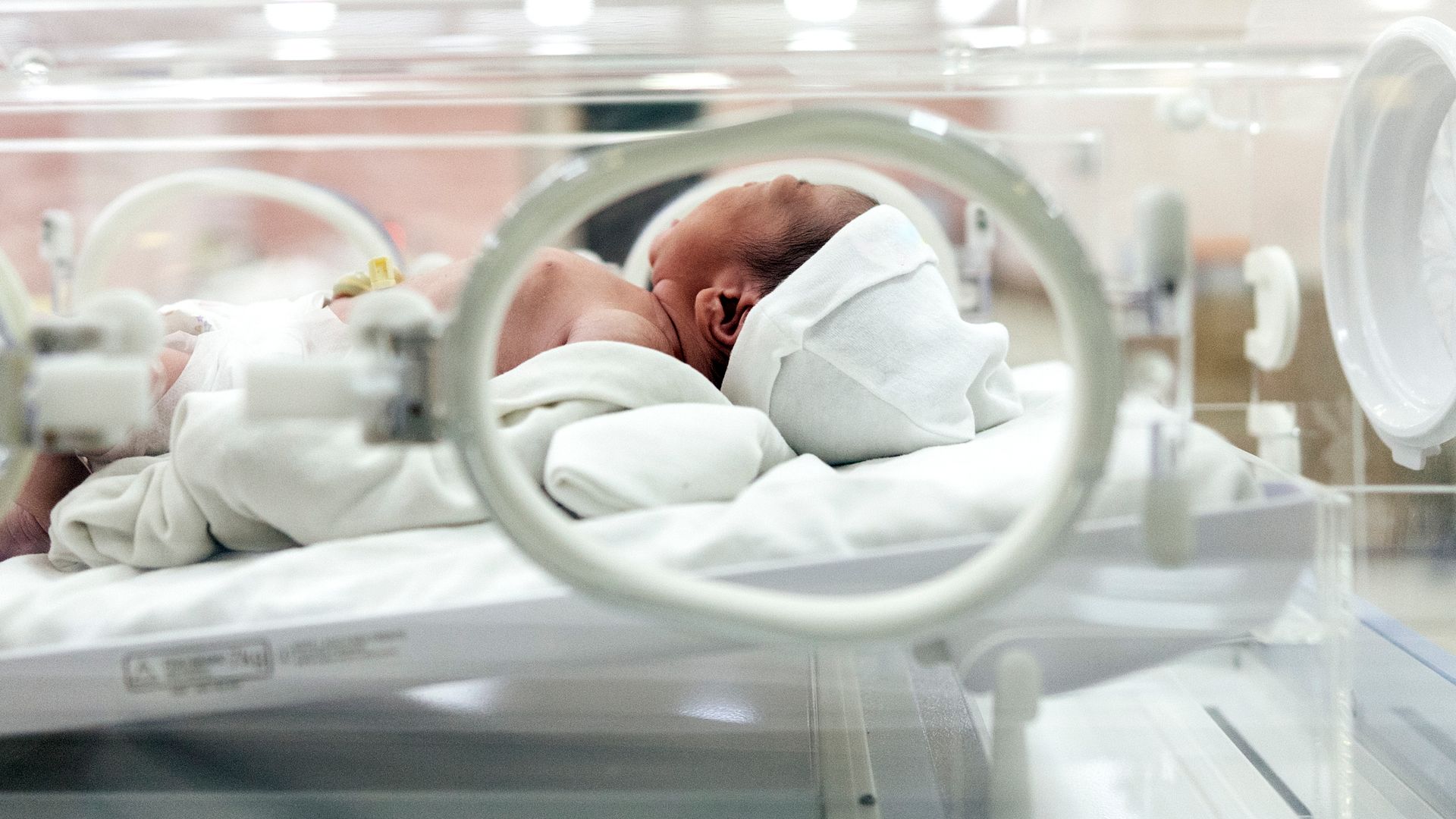
Fertility rate for US women in 2023 hits lowest level in a century: CDC
By Lauren Taylor (Anchor), Jake Maslo (Video Editor), Evan Hummel (Producer)
Media Landscape
See how news outlets across the political spectrum are covering this story. Learn moreBias Distribution
Left
Right
Untracked Bias
Women in the United States are giving birth at record-low rates, according to federal data released on Thursday, April 25. The report, conducted by the Centers for Disease Control and Prevention and the National Center for Health Statistics, found that the total fertility rate fell to 1.62 births per woman in 2023, marking the lowest rate recorded since the 1930s.

Download the SAN app today to stay up-to-date with Unbiased. Straight Facts™.
Point phone camera here
Dr. Brady Hamilton, a statistician with the National Center for Health Statistics and lead author of the report, said that the decline reflects ongoing trends as women navigate economic uncertainty and societal challenges, choosing to delay or forgo having children.
Hamilton said that factors contributing to this trend include establishing careers and access to contraception. Meanwhile, many young couples are increasingly investing in homeownership and paying off student debt, affecting their decision to have children.
The recent data coincides with broader cultural shifts including the U.S. Supreme Court’s decision to overturn Roe v. Wade. Some states with abortion bans have seen increases in fertility rates, which suggests a correlation between reproductive rights and fertility trends.
Declining birth rates can also reportedly have a number of detrimental effects on the United States. First, declining birth rates can create a decline in population, however, record numbers of immigrants coming into the U.S. have offset those losses in recent years.
Unbiased news.
Directly to your inbox. Free!
Learn more about our emails. Unsubscribe anytime.
By entering your email, you agree to the Terms & Conditions and acknowledge the Privacy Policy.
Low fertility rates may also reduce the number of workers contributing to the economy, which can in turn affect the sustainability of Social Security.
Hamilton maintains that many women want children but often choose to delay motherhood. However, despite advances in fertility treatments, science suggests that trying to conceive later in life carries lower success rates and greater health risks.
[LAUREN TAYLOR]
AMERICAN WOMEN ARE GIVING BIRTH AT RECORD LOW RATES, ACCORDING TO THE CDC.
THE TOTAL FERTILITY RATE FELL TO 1.62 BIRTH PER WOMAN IN 2023, THE LOWEST RATE SINCE THE 1930S.
THE LEAD AUTHOR OF THE STUDY SAYS THE DECLINE SHOWS MANY WOMEN ARE FOREGOING OR DELAYING HAVING KIDS BECAUSE OF ECONOMIC UNCERTAINTY– AND SHIFTING SOCIETAL NORMS.
THE AUTHOR SAID WOMEN ARE INCREASINGLY FOCUSED ON ESTABLISHING CAREERS AND CONTRACEPTION IS MORE ACCESSIBLE.
AND YOUNG COUPLES ARE ALSO PAYING OFF STUDENT LOANS AND INVESTING IN HOMES, WHICH MAY TAKE PRIORITY OVER HAVING KIDS.
THE DECLINE IN BIRTH RATES VARIES ACROSS AGE GROUPS AND ETHNICITIES.
WOMEN IN THEIR MID-TO-LATE 30S ARE HAVING CHILDREN AT SIMILAR RATES TO THOSE IN THEIR EARLY 20S.
WHILE BIRTH RATES AMONG TEENS HAVE REACHED RECORD LOWS.
THE RECENT DATA COINCIDES WITH BROADER CULTURAL SHIFTS.
INCLUDING THE SUPREME COURT’S DECISION TO OVERTURN ROE V. WADE.
SOME STATES WITH ABORTION BANS HAVE SEEN INCREASES IN FERTILITY RATES.
SUGGESTING A CORRELATION BETWEEN REPRODUCTIVE RIGHTS AND FERTILITY TRENDS.
DECLINING BIRTH RATES CAN HAVE A NUMBER OF DETRIMENTAL IMPACTS ON A NATION. FIRST AND FOREMOST IT CAN CREATE A DECLINE IN POPULATION, HOWEVER RECORD NUMBERS OF IMMIGRANTS COMING INTO THE U.S. HAVE OFFSET THOSE LOSSES IN RECENT YEARS..
IT MAY ALSO REDUCE THE NUMBER OF WORKERS CONTRIBUTING TO THE ECONOMY, WHICH IN TURN CAN AFFECT THE SUSTAINABILITY OF SOCIAL SECURITY.
THE AUTHOR OF THE STUDY MAINTAINS MANY WOMEN WANT CHILDREN BUT OFTEN CHOOSE TO DELAY MOTHERHOOD.
BUT DESPITE ADVANCES IN FERTILITY TREATMENTS, SCIENCE SHOWS TRYING TO CONCEIVE LATER IN LIFE CARRIES LOWER SUCCESS RATES AND GREATER HEALTH RISKS.
Media Landscape
See how news outlets across the political spectrum are covering this story. Learn moreBias Distribution
Left
Right
Untracked Bias
Straight to your inbox.
By entering your email, you agree to the Terms & Conditions and acknowledge the Privacy Policy.
MOST POPULAR
-
 Getty Images
Getty Images
Democrats in Congress receive lowest approval rating in Quinnipiac poll history
Watch 2:5910 hrs ago -
 Getty Images
Getty Images
AG Bondi reviewing Epstein documents for release, could hold client list
Watch 1:4811 hrs ago -
 Getty Images
Getty Images
Speaker Johnson won’t support DOGE stimulus checks
Watch 2:0612 hrs ago -
 Reuters
Reuters
UN chief reveals his plan for peace in Haiti to Caribbean leaders
Watch 2:1514 hrs ago




